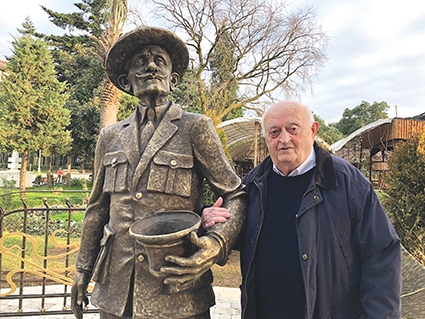The Truth about the Batumi Botanical Garden
Op-Ed
Russians have a tendency to think that it was only they who brought abundance and civilization to Georgia by cutting a window between the local dark and the western light. Russia has certainly tried to create for herself a hedonistic comfort in this beautiful land, having also managed to establish herself as an overbearing patron, bossing around the amiable Georgians for a couple of centuries. Russians keep being sincerely surprised at the arrogance of Georgians for choosing to relinquish the “sweet and caring” Russia for the “ravenous and perfidious” West. Russians cannot help being surprised because the ungrateful Georgians have utterly forgotten the good they have done in Georgia, like the development of the famous Borjomi area with its spas and other valuable amenities, the construction of numerous historical buildings, still standing in the capital city and other urban spots, the creation of parks and gardens, including the unique botanical garden in Batumi. I will refrain from describing this amazing green haven and its story of survival; I will only divulge a little piece of good news that accidentally caught my attention.
Last Saturday, April 14, an interesting new monument was dedicated on the beautiful Batumi Boulevard. The news escaped most of us, but inquisitive Georgian minds noted that the monument should have been put there long ago. The sculpture reflects the image of Iason Gordeziani – the brilliant Georgian botanist and biologist whose contribution into the creation and development of the Batumi Botanical Garden is humongous. The presentation of the book (250 p.) about this gardening wizard, written by Georgian encyclopedic expert and publicist Otar Gagua, also took place as part of the ceremony of opening the monument. Not many people in this country, and maybe in the world, have graduated from the Versailles National Agricultural Institute in France; Iason Gordeziani did, almost a century ago, and went on to commit his life, knowledge and expertise to creation, maintenance and preservation of that Manmade pearl of the nature which we currently know as the Batumi Botanical Garden.
Only after many years of laborious research into the fact, performed by our compatriot Otar Gagua, was the story brought to daylight. If not for him, the truth would have stayed in the shadows forever. The Russian historiography has propagated and perpetuated the idea that the founder of the Batumi Botanical Garden was the Russian scientist Andrei Nikolaevich Krasnov. The Krasnov supporters still persist with their version of the Garden history. Says the author of the valuable monograph: ‘The aim of my research was not the promotion of another Georgian whose name happened to be Gordeziani, but only the desire to honestly observe encyclopedic rules and demands.’ Indeed, Krasnov was once appointed the director of the Garden by the Batumi municipality, but he should not be considered its founder. According to Gagua, Krasnov’s part in the event was only nominal.
The Garden was actually founded by the City of Batumi in 1912, with the help of the Russian money of course. The preliminary research was done by botanist Tatrinov who managed to build the Botanical Garden on 10 hectares of land; the microclimate of the Garden’s location was studied by Professor Voeykov and Agronomist Clingen. They also established the similarity of the local climate with the Japanese climate and created a scheme for the phytogeographic disposition of the future Garden. After that, the territory of the Garden was increased up to 74 hectares and today it is as big as 110 hectares. And most importantly, the entire project was vitalized, rendered vibrant and turned into reality by Iason Gordeziani, whose crucial role in this significant agricultural project was up until now ignored. What matters most is that the truth about the famous Batumi Botanical Garden has not escaped modern history, and the recently dedicated sculpture of Iason Gordeziani now proudly stands where it rightfully belongs.
Nugzar B. Ruhadze












